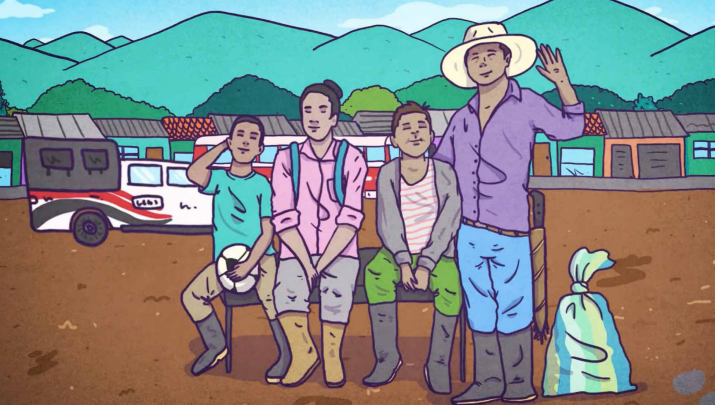The use of life stories in research and policy engagement is challenging but comes with a number of advantages that are difficult to replicate with other approaches. These are outlined below, after first explaining what life (hi)story research is.
There are different types of life-history or life-story research. As such, there is no standard definition of this methodology and what it entails, although our approach broadly subscribes to Watson and Watson-Franke’s definition of a life history as ‘any retrospective account by the individual of his [or her] life in whole or part, in written or oral form, that has been elicited or prompted by another person’. Life stories are distinguishable from other forms of oral history and narrative research by their focus on individuals’ experiences and emotions. For example, they may be contrasted to oral testimonies, which can be highly personal but are ultimately focused upon pre-identified issues or events. Life stories typically touch upon multiple ‘bigger’ issues and events but, unlike oral testimonies, centre upon the narrator and their life.
Moreover, most forms of life-(hi)story research share a ‘common goal […] to help overlooked or disenfranchised individuals make their stories known’. In doing so, life-history projects often challenge and destabilise hegemonic discourses.
Thus, the tradition of life-story research aligns with the overall objective of our ‘Voices from the borderlands’ publications: to provide an opportunity to listen to and learn from the voices and experiences of individuals and communities living in drugs-affected borderland regions – voices and experiences that are too often unheard and unknown.
Interview fragments, narrative ethnographies and fieldwork photographs certainly help humanise and ground analysis, but life stories take this to another more profound level. Our brains process stories differently from ‘facts’. Reading or listening to life stories can be deeply transformative. Particularly compelling stories can transport the reader/listener to other places and times and also help them identify with the narrator or main character(s) and to understand the places in which they live. They have the power to elicit empathy and a form of understanding based on human connection that other forms of engagement cannot.
Stories also reveal important contradictions, nuances and ambiguities. For example, a single narrator’s experiences and perceptions of an insurgent armed group are sometimes extremely mixed, suggesting that they cannot be easily sorted into categories like ‘sympathisers’ or ‘detractors’. The same can be said about illicit drug economies, which in the borderlands where we work permeate people’s lives in positive, negative and ambivalent ways.
These stories provide a sense of the everyday lives of people affected by drug economies and the particular borderland environments of risk and opportunity that they navigate.
As such, they are both personal and spatial biographies; they unveil the complex interplay between structure and agency that shapes people’s life trajectories and wider processes of change in borderland regions. Life stories remind us that ‘it is ordinary people who make human society and that they are not merely passive subjects of abstract structures or powerful individuals.’ They draw attention to the incredible resilience, adaptability and innovation of people living in challenging environments and the role that illegal drug economies play in empowering and eroding these forms of agency.

Life stories also offer insights into the role that people play in shaping the drug environments in which they live, and go beyond portrayals of marginalised communities as ‘passive victims’ of systemic forces that dominate their lives. They offer ways to better understand how people engage with drugs as part of their efforts to exercise agency in shaping their own social worlds, and to try to navigate the multiple risks they confront. Yet, at the same time, life stories also reveal how these everyday activities and survival strategies – including engagement with drugs – often articulate and reinforce prevailing structures of power and inequality rather than empowering them or providing the impetus for change.
Working with life stories is not about separating out the study of ‘little’ politics from ‘Big’ politics, of people’s history from elite history, or of the subjective, cultural and emotional realm from material, structural and institutional forces. Rather, it offers a way to explore the entanglements and relationships between structural forces and everyday practices and how these shape people and places.
Importantly, stories help us to think about the people who participate in drug economies as real people with names, with family members they love but also quarrel with, with stories of suffering but also of kindness and perseverance.
The type of understanding that stories can provide is vital for developing truly ‘people-centred’ and ‘context-sensitive’ drug policies.
Finally, so far, we have focused on the importance of life stories for ‘outsider’ readers or listeners. But research participants can also find that narrating their own stories a powerful and meaningful experience, which helps clarify and create new understandings of events around their lives. The importance and power of constructing life stories is demonstrated by their use in settings of intense disruption and dislocation to recover lost or repressed community histories. Life histories can help people give meaning to difficult experiences or to gain a sense of control over them. The construction of meaning through personal narrative is what makes us human and represents a deep-seated need in developing individual and collective identities.

